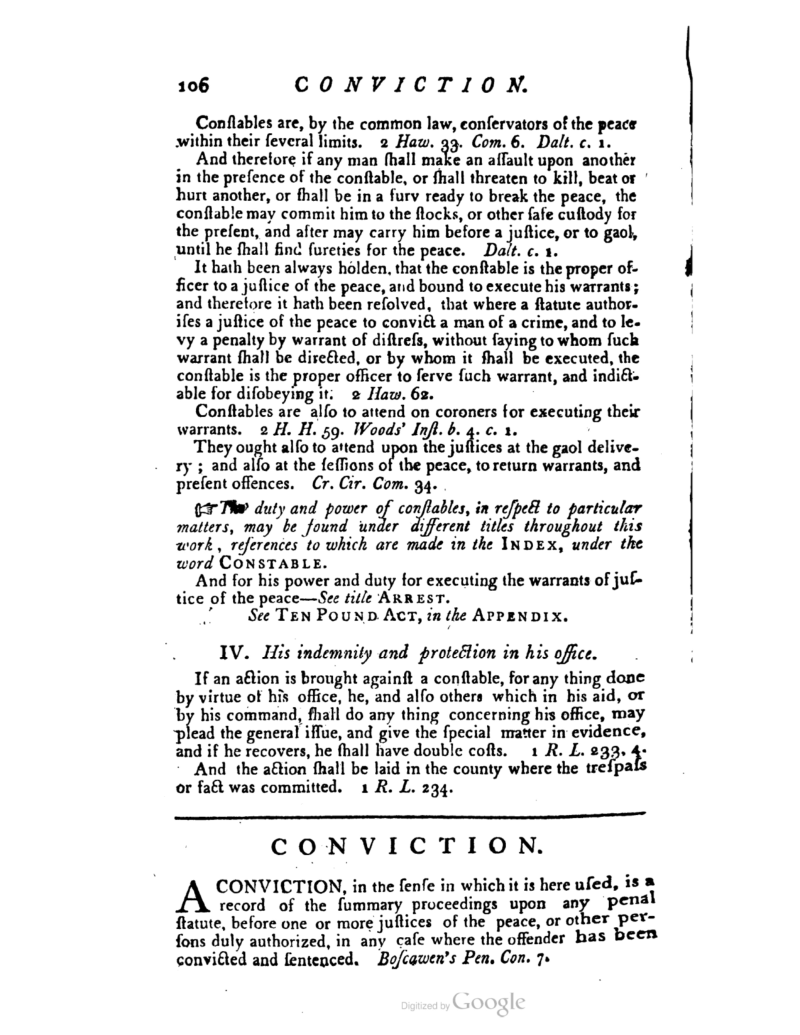1803 Law book outlines what justices are to look for before convicting someone of a crime.
- Type
- Book
- Source
- N/A Non-LDS
- Hearsay
- Direct
- Reference
A New Conductor Generalis: Being a Summary of the Law Relative to the Duty and Office of Justice of the Peace, Sheriffs, Coroners, Constables, Jurymen, Overseers of the Poor, &c. &c. (Albany: O. & S. Whiting, 1803), 106-7
- Scribe/Publisher
- O. & S. Whiting
- People
- N/A
- Audience
- Reading Public
- Transcription
CONVICTION
A conviction, in the sense in which it is here used, is a record of the summary proceedings upon any penal statute, before one or more justices of the peace, or other persons duly authorized, in any case where the offender has been convicted and sentenced. Boscawen's Pen. Con. 7.
This mode of proceeding was first introduced for the greater ease of the citizen, by doing him speedy justice, and by not harassing the freeholders with frequent and troublesome attendances to try every minute offence. 4 Black. Com. 280.
And this authority being special and in restraint of the common law, it must appear on the face of the proceedings, that is has been strictly pursued, according to the title of the act by which it was created; that the justice has jurisdiction in the case, and that rules similar to those adopted by the common law in criminal prosecutions, and founded in natural justice, have been observed unless the statute (as it does in some instances) expressly dispenses with the form of stating them. Williams Just. 545.
And it is reasonable that these convictions should be construed with strictness, because they must be taken to be true against the defendant. 1 Barr. 613.
But although the superior court of justice are strict in requiring a precise specification of the offence, so as to give the magistrate jurisdiction; yet if the other proceedings are stated with a reasonable degree of accuracy, the court will not be astute in discovering defects in such conditions, for whether it was expedient that those summary jurisdictions should have been erected, was a matter for the consideration of the legislature; and so long as they exist, the court out to pursue the intent of those who created them, and expound their acts in to reasonable a manner as that they may be executed. 1 Ld. Raym. 581. 2 Term. Rep. 18. Boscawen 8, 9, 10.
Therefore in whatever light they may have formerly been viewed, yet the people are now convinced, that they derive considerable advantage form the exercise of the powers delegated to the justices of the peace, and in modern times they have received every support from the courts of law. 2 Term. Rep. 18.
In these convictions, it is necessary that there should be, first, an information or charge against the defendant; secondly a summons or notice of such information in order that he may make his defence; thirdly, his appearance or non-appearance; fourthly, his defence and confession; fifthly, the evidence against him in case he does not confess; and sixthly, the judgment or adjudication. Williams' Just. 546.
And in general all these matters must be particularly set forth in record of the conviction.
- Citations in Mormonr Qnas
The B. H. Roberts Foundation is not owned by, operated by, or affiliated with the Church of Jesus Christ of Latter-day Saints.

